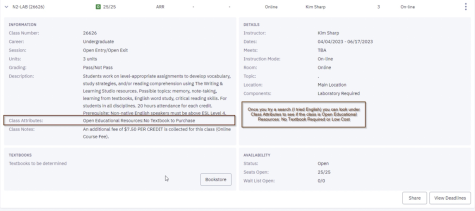No Cost Course Material
The Three Wise Librarians give money saving gifts of knowledge
March 16, 2023
A library is a place overflowing with academic materials. It is a space that contains a variety of book collections and sources of information, which makes it accessible to a community of scholars for referencing as well as borrowing. It is a place that brings individuals together that are willing to expand their knowledge.
The library is also considered to be economical since it can help people save money by getting access to information and resources at no cost. Just like many others, SCC’s library shares a similar nucleus of functions ranging from the availability of material from physical (hard copies) or digital access (ebooks); accompanied by a physical building or study-room, or a virtual space.
As the academic education fees are increasing, the Shoreline college library decided to host an event during the process of Spring quarter registration, presented by three different librarians.
“Course Material On a Budget” was intended to inform student attendees about effective methods which individuals can efficiently use to save on academic materials because purchasing course materials is daunting for many students
Meet with Caitlan Maxwell, a Digital and Electronic Collection Librarian, Liaison to Humanities, also the first presenter covered two topics of
What is Open Education? – Open Educational Resources
Open Education encompasses resources, tools and practice that are free of legal financial and technical barriers and can be fully used, shared and adapted in the digital environment. Open Education maximizes the power of the internet to make education more affordable, accessible, and effective. It includes Open Scholarship, Open-source Software, Open Access Publishing (digital Newspaper), and Open Educational Resources which are textbook and courseware (math problems).
Textbooks are one of the most essential and needed elements toward college class education, and Did you know? – the price of textbooks has skyrocketed more than three times the rate of inflation of decades past. The high cost of textbooks has become a serious obstacle to many college students, yet through Open Education Resources, textbook costs should not be a barrier to education.
“[through] using Open Educational Resources, the material is free online, openly licensed, affordable in print, and can be saved forever, before, during and after class.” said Maxwell, and then continued, “So usually when you have a textbook, you might use it for the quarter and then you wanna sell it back? Or your rental is due and you have to return it, but with OER, you can have access to it forever.” Here is how open textbooks work: it is available for free to read online and download, or it can be printed at low-cost, typically $20-40. Learn more!
How to find classes that have low-cost or OER: No Textbook to Purchase course materials?
Student can also search for the classes that required no textbook to purchase or even low-cost by following these steps:
-
Go to Shoreline CC class schedule and click on “More Filters”

-
Once you click on more filters, go to the “Course Attribute”, dropdown menus and select “Low-Cost Textbooks” as well as “OER: No textbook to Purchase”. English subject as an example.

-
Once you do a search, you can check the course description and “Class Attributes” to see if the class is listed as Low-Cost or Open Educational Resources: No Textbook to Purchase.

Lauren V. Bryant, a Usability and Web Librarian, Liaison to STEM/Automotive, was the next presenter who presenting two topics including:
Using Digital Textbook Online (Safely!)
Public Domain CCO is a permissible license, an example of OER. Bryant shared Hathi Trust, a website with many books that are in the public domain. Other OER lisceses include CC-BY, CC BY- SA, CC BY-ND. The complete list of Creative Commons License can be found at Creative Commons.
Worldcat.org. is a site that connects you to legal ebooks, searchable and easily filtered, finds editions/formats, and shows the free ones first. Bryant even called that site an “Aggregate” because it pulls things from other resources as well as more likely to give a free, open access. Plus, it shows the different libraries that have the resources where you can borrow directly.
Additionally, during the presentation, Bryant also pointed out the difference between legal and pirated ebooks. As demonstrated by, if a library owns three copies of the title and digitizes one copy, it may use CDL to circulate one digital copy and two prints. Suppose that the library lets the borrower check out the ebook, then they may not check out the printed copy of the same book, since the library is not allowed to lend out unlimited copies.
How to Use Older/Cheaper Editions of Textbooks?
Oftentimes, individuals can use an older edition of a textbook, which is cheaper to purchase, by easily searching for the chapter name, topic, or exercise instead of page number, through this site. Additionally, Bryant also introduced a bookstore comparison site where the prices are manifested from different stores, which make it more convenient as well as effortless for individuals to make a comparison and evaluation on the price of the book.
“If you absolutely want to buy something, I want you to get the least expensive things,” said Bryant.
Last but not least, meet with Mary Blanchett, a Library Archives Paraprofessional 2, covered one of the significant topics which is related to SCC library resources, namely Reserve Collection.
What is the Reserve Collection?
Typically, Reserve Collection, are not just the textbooks, which can be checked out for a short time, but there are other class aids such as skeleton and brian models, molecular model kits, mineral and rock kits, chess games, fencing equipment, and graphing calculators. Plus, laptops are also available in the library to check out for the quarter, in essence, it can be renewed.
The fundamental material that college students are required to have throughout their academic journey in order to make their education more efficient, practical, and convenient is the use of laptops. Since there are a number of assignments which may require some research, and theoretical lecture learning, a laptop is needed for many students. “Laptops [are] a big part of what has been checked out at the library,” said Blanchett.
In addition, students can keep the laptop for more than one quarter, “If you decided you want to keep, so how you do that is really simple, you go back to the exact same point [site that you once requested] and put where it said “renew”, then you extend will be keep up for the next quarter, so you don’t have you bring in back to us, you can go ahead and keep it” Blanchett continued presenting. Students can submit their request form here.
Beside all of the following tips, meet with student attendee, Amber Huang, a Shoreline student from Taiwan, shared her experience about this event, “I feel like this event is very helpful to those who wish to save money on course material and supplies”, and then continued talking about her favorite part, “ I like how Lauren integrated a Kahoot game into her presentation because that really boost audience engagement and heighten retention of the tips given at this event.”
A previous edition of this article had a few factual inaccuracies. This story has been corrected to reflect the proper librarian terminology, soft copies have been changed to ebooks and the explanation of how these copies work have been updated.






